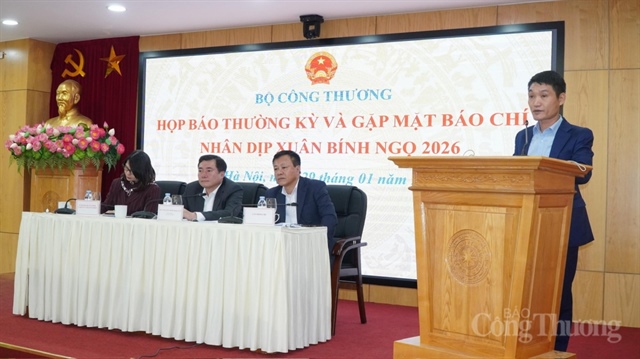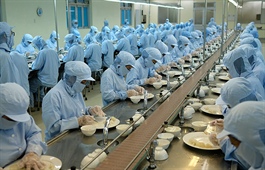Petrol and oil price stabilisation fund requires thorough appraisal
Petrol and oil price stabilisation fund requires thorough appraisal
The Government needs to carefully evaluate the effectiveness of the petrol and oil price stabilisation fund in keeping the commodity’s retail prices stable before deciding to maintain or eliminate the tool, experts said.

Viet Nam is considering amending the Law on Price, which mentions several commodities under the Government’s price stabilisation scheme including petrol and oil.
Currently, the Government is using the petrol and oil price stabilisation fund to support its regulation of domestic petrol and oil prices when necessary. Skyrocketing oil prices in the global market over recent months have fueled the rise in retail price of petrol and oil in Viet Nam, forcing State management agencies to make use of the fund to intervene in the market.
Experts raised concerns, as in the first draft Law on Price, which was released in June this year, the Finance Ministry commented it was then suitable to eliminate the petrol and oil price stabilisation fund so that this commodity can run in accordance with market signals. However, in the second draft released recently, the Government suggests keeping this fund without any evaluation or review of the matter.
At a meeting last week to give opinions on the second draft law, Chairman of the National Assembly (NA) Vuong Dinh Hue stressed that the Government should look at different opinions on this issue, along with corresponding handling methods for each case.
NA’s Standing Vice Chairman Tran Thanh Man said the revised law should be built on the basis of compliance with the market price regulation mechanism to reduce the State's intervention. Besides, it must overcome shortcomings related to corruption and group interests.
Chairman of the NA’s Economic Committee Vu Hong Thanh said the scope of amendments to the law was very wide and would have great influence on the production and business activities of many industries and fields across the country. The law was also related to many other laws that would be amended in the near future, such as the Civil Code, Laws on Land, Enterprise, Procurement and Consumer Protection. Therefore, the handling of overlapping conflicts between the Law on Price and the above-mentioned laws needed to be reviewed to ensure the consistency of the country’s legal system.
“It is necessary to review carefully and cautiously to have more convincing explanations for each commodity and service included in the law,” Thanh noted.
According to Thanh, many businesses reported that the management of the petrol and oil price stabilisation fund hadn’t been flexible and the fund’s positive impacts on domestic petrol and oil prices remained modest.
The businesses said Viet Nam's petrol and oil prices were strongly fluctuating along with global prices for the foreseeable future as the country's petrol supply could only meet 70 per cent of domestic demand. While the fund might suffice in the event of slight increases, it was inadequate in responding to strong fluctuations. To make matters worse, it had proven to hinder bringing down prices as retailers lack incentives to improve sales during periods in which domestic prices are lower than the international market.
In addition, the businesses urged the Government to consider shortening the current price adjustment period from 10 to five days to help petrol retailers reduce expenses.
Chairwoman of the NA’s Judiciary Committee Le Thi Nga also suggested that it was necessary to carefully review the effects of the fund in the recent petrol price hikes before recommending to keep or remove it.
Sharing the same view, economist Dr Bui Trinh said State management agencies should seek to examine the impact of the petrol price stabilisation fund since its inception before drawing any conclusions.
Trinh voiced his support for the common view held by other experts that the Government should consider removing taxes as it seeks to reduce current petrol prices, helping curb inflation and facilitate economic recovery.
At the meeting, Minister of Finance Ho Duc Phoc said the second draft law maintained regulations on the fuel price stabilisation fund since the global price for the commodity was still unpredictable. The fund still played its necessary role of regulating domestic gas prices to minimise negative impacts on the prices of other merchandise.
“The proposal to still maintain this fund is because, after evaluation, it is clear that the fund has created positive influences on the market, leading to impressive benefits for the economy, especially in such an unstable year for fuel as 2022,” he said.
According to Phoc, without this fund, the dependence only on tax and service fee reduction can only address the issue for the short term. There are many synchronous measures to keep the petroleum price stable. The fund is just a tool to stabilise the petrol price besides other tools such as taxes, fees and regulations on diversifying supply or reducing prices for other costs. However, the ministry wants to keep the fund as it can help support adjusting gasoline and oil together with other measures. It is necessary to use the fund and other measures to stabilise the petrol price as petrol and energy are two important economic security areas that must be paid special attention to.
Besides, it is fine to reduce taxes and fees as a short-term solution, but it is very difficult in the long term. Once making the reduction, it will be very difficult to increase the taxes and fees later.
On September 21, petrol and oil prices were adjusted down by the ministries of Industry and Trade, and Finance. The retail price of bio-fuel E5RON92 dropped by VND450 to VND21,781 per litre, while that of the popular RON95-III gasoline was cut by VND631 to no more than VND22,584 per litre.
Diesel 0.05S and kerosene are now sold at VND22,536 and VND22,441 per litre, marking decreases of VND1,644 and VND1,977, respectively.
Meanwhile, the price of mazut 180CST was cut by VND383 to VND14,656 per kilo.
Since the beginning of the year, the domestic petrol price has undergone a total of 25 adjustments, including 13 increases and 11 decreases. The retail bio-fuel E5RON92 and RON95-III gasoline prices are currently the same as they were in October 2021.
The two ministries have agreed to subsidise each litre of E5RON92 with VND451, RON95 with VND450, diesel with VND300, kerosene with VND300, and mazut with VND741, sourced from the petrol and oil price stabilisation fund.

























